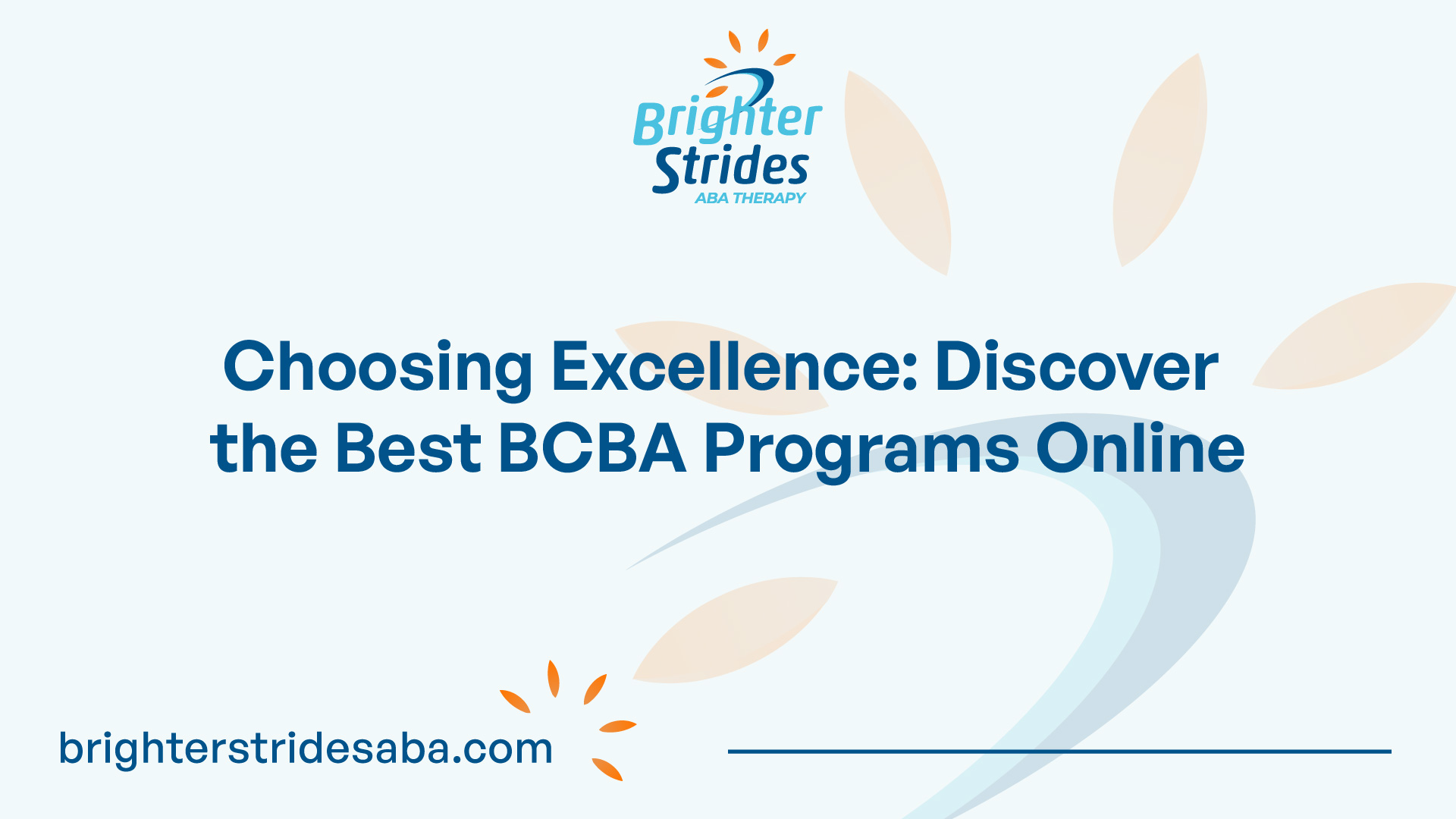Understanding BCBA Programs
To embark on a career as a Board Certified Behavior Analyst (BCBA), it is essential to understand what BCBA programs entail and the benefits they offer.

What Are BCBA Programs?
BCBA programs refer to educational programs that prepare individuals to become certified behavior analysts. These programs provide the necessary knowledge and training required to work effectively in the field of applied behavior analysis (ABA). ABA focuses on understanding and modifying behavior to improve the lives of individuals with behavioral challenges.
To qualify for BCBA certification, individuals must meet specific educational and experience requirements set forth by the Behavior Analyst Certification Board (BACB). These requirements typically include obtaining a graduate degree in a related field, such as ABA, special education, or psychology, and completing a specified number of approved courses in behavior analysis.
BCBA programs are designed to provide students with a comprehensive understanding of behavior analysis principles, assessment techniques, intervention strategies, and ethical considerations. They equip individuals with the knowledge and skills necessary to assess, design, and implement behavior change programs to improve the lives of individuals with behavioral challenges.
Benefits of BCBA Programs
Enrolling in a BCBA program offers several benefits for individuals interested in pursuing a career in behavior analysis. Some key advantages include:
- Professional Recognition: Graduating from a BCBA program and obtaining certification demonstrates a high level of expertise and professionalism in the field of behavior analysis. It enhances credibility and opens up a wide range of career opportunities.
- Specialized Knowledge: BCBA programs provide in-depth knowledge of behavior analysis principles, assessment techniques, and evidence-based intervention strategies. This specialized knowledge equips individuals with the necessary tools to effectively address behavioral challenges across various settings.
- Hands-On Experience: BCBA programs typically include supervised practical experience, allowing students to apply theoretical knowledge in real-world settings. This hands-on training is a crucial component of becoming a certified behavior analyst, as it helps individuals develop clinical skills and gain practical experience.
- Career Advancement: BCBA certification opens up a wide range of career opportunities. BCBAs can work in various settings, including schools, clinics, hospitals, and community organizations, providing behavior analytic services to individuals with developmental disabilities and other behavioral challenges.
- Ethical Responsibilities: BCBA programs emphasize ethical considerations and professional conduct in the field of behavior analysis. Graduates of these programs are equipped with a strong understanding of ethical guidelines and are committed to upholding ethical standards in their practice.
BCBA programs play a critical role in preparing individuals to make a positive impact on the lives of individuals with behavioral challenges. They provide the necessary education and training to become effective behavior analysts and contribute to the field of applied behavior analysis.
In the next section, we will explore the world of online BCBA programs, highlighting their features, advantages, and considerations for choosing the right program.
Online BCBA Programs
For individuals interested in pursuing a career as a Board Certified Behavior Analyst (BCBA), online programs provide a flexible and convenient option to acquire the necessary knowledge and skills. Online BCBA programs offer the same comprehensive curriculum as on-campus programs, allowing students to study from the comfort of their own homes while balancing other commitments.
Overview of Online BCBA Programs
Online BCBA programs are designed to meet the educational requirements set by the Behavior Analyst Certification Board (BACB). These programs typically align with the BACB Fourth Edition Task List, which outlines the foundational knowledge and skills for behavior analysts. They provide coursework that covers areas such as applied behavior analysis, research methods, ethics, and behavior change procedures.
One advantage of online BCBA programs is the flexibility they offer in terms of scheduling and pace of study. Students can access course materials and lectures at their convenience, allowing for a personalized learning experience. Many online programs have multiple start dates throughout the year, providing greater flexibility in program entry.
Top Online BCBA Programs
Several reputable institutions offer online BCBA programs that are accredited by the BACB. These programs provide high-quality education and prepare students for the BCBA certification exam. Here are a few examples of top online BCBA programs:

Program details and admission requirements may vary, so it’s recommended to visit the respective institution’s website for more information.
Considerations for Choosing an Online BCBA Program
When selecting an online BCBA program, there are several factors to consider:
By considering these factors, individuals can make an informed decision when choosing an online BCBA program that best suits their needs and helps them embark on a successful career in behavior analysis.
Requirements for BCBA Certification
To become a Board Certified Behavior Analyst (BCBA), individuals must meet specific requirements set by the Behavior Analyst Certification Board (BACB). These requirements encompass coursework, supervised fieldwork experience, and passing the BCBA Certification Exam. Let’s take a closer look at each of these requirements.
Coursework Requirements
To be eligible for BCBA certification, individuals must complete a relevant graduate degree program that meets the BACB’s coursework requirements. The coursework must cover specific content areas, including:
The specific number of credit hours required in each content area may vary depending on the program and the BACB’s guidelines. It’s important to ensure that the chosen BCBA program satisfies the coursework requirements set by the BACB.
Supervised Fieldwork Experience
Supervised fieldwork experience is a crucial component of becoming a BCBA. Individuals must complete 1,500 hours of supervised fieldwork experience within a 12-month period. During this experience, individuals gain hands-on training and apply the principles of behavior analysis in real-world settings.
The fieldwork experience must be supervised by qualified professionals. There should be a minimum of two supervisors, with at least one being a Board-Certified Behavior Analyst (BCBA) or a Board Certified Assistant Behavior Analyst (BCaBA). Individual and group supervision hours must be logged to ensure adequate guidance and support throughout the fieldwork experience.
It’s important to note that the fieldwork experience should be completed within 180 days and should not exceed a 12-month period from the start date. Meeting these requirements ensures that individuals gain the necessary practical skills and knowledge to become competent BCBAs.
BCBA Certification Exam
After completing the coursework and supervised fieldwork experience, individuals must pass the BCBA Certification Exam. This comprehensive exam assesses the individual’s understanding of behavior analysis principles, ethical considerations, and practical application of behavior analysis techniques.
The BCBA Certification Exam consists of multiple-choice questions that cover various content areas within behavior analysis. It tests the individual’s ability to apply knowledge and make informed decisions in real-world scenarios. Passing this exam demonstrates the individual’s competence in the field of behavior analysis and qualifies them for BCBA certification.
Successfully meeting the coursework requirements, completing supervised fieldwork experience, and passing the BCBA Certification Exam are essential steps on the path to becoming a BCBA. These requirements ensure that individuals possess the necessary theoretical knowledge, practical skills, and ethical understanding to provide effective behavior analysis interventions and support to individuals with behavioral challenges.
Career Opportunities with BCBA Certification
Earning a Board Certified Behavior Analyst (BCBA) Certification opens up a wide range of career opportunities in the field of behavior analysis. BCBAs are rigorously trained professionals who provide behavior-analytic services, such as designing and implementing behavior analysis programs, overseeing the services of others, and evaluating the effectiveness of interventions. Let’s explore the scope of practice for BCBAs, the industries and settings in which they work, and the impact they have on individuals with behavioral challenges.
Scope of Practice for BCBAs
BCBAs have a broad scope of practice, utilizing their expertise in behavior analysis to address various behavioral challenges. They work with individuals across different age groups and developmental stages, including children, adolescents, and adults. BCBAs have the knowledge and skills to assess behavior, develop behavior intervention plans, and monitor progress over time.
BCBAs also play a crucial role in supporting individuals with autism spectrum disorder (ASD) and other developmental disabilities. Their specialized training allows them to design and implement effective interventions tailored to the unique needs of each individual. By utilizing evidence-based strategies, BCBAs help individuals with behavioral challenges lead more fulfilling lives.
Industries and Settings for BCBAs
BCBAs can work in diverse industries and settings, making their expertise invaluable in various professional contexts. Some of the industries where BCBAs are commonly employed include:
Impact of BCBAs on Individuals with Behavioral Challenges
The impact of BCBAs on individuals with behavioral challenges, especially those with autism spectrum disorder (ASD), is significant. By utilizing behavior analysis principles, BCBAs can improve behavior, communication, social skills, and overall quality of life for their clients. They work closely with individuals and their families to develop personalized intervention plans that address specific needs and goals.
BCBAs help individuals with behavioral challenges acquire new skills, reduce problem behaviors, and increase independence. Through ongoing assessment and data analysis, they modify interventions to ensure progress and make necessary adjustments. BCBAs also provide support and guidance to families, empowering them to continue implementing effective strategies at home.
In conclusion, obtaining BCBA certification provides professionals with a wealth of career opportunities. BCBAs can make a profound impact on individuals with behavioral challenges, working in diverse industries and settings to address behavior-related issues and improve outcomes for their clients.
Online BCBA Programs vs. On-Campus Programs
When considering pursuing a BCBA (Board Certified Behavior Analyst) program, individuals have the option to choose between online and on-campus programs. Both formats have their own advantages and considerations. Let’s explore the benefits of online BCBA programs and discuss the accreditation and quality of these programs.
Benefits of Online BCBA Programs
Online BCBA programs have gained popularity due to the flexibility and convenience they offer, as mentioned by Applied Behavior Analysis Edu. Here are some of the key benefits of online BCBA programs:
Accreditation and Quality of Online Programs
Accreditation is an important aspect to consider when choosing an online BCBA program. The BACB encourages potential students to carefully review the BACB’s Accredited Programs list to ensure that their chosen online program meets the necessary requirements for certification, as mentioned by the BACB.
It’s crucial to select an online program that aligns with the Behavior Analyst Certification Board (BACB) Fourth Edition Task List, which outlines the foundational knowledge and skills for behavior analysts. Many online BCBA programs offer coursework that aligns with this task list, ensuring that students are well-prepared for the certification exam, as stated by Intelligent.
Quality assurance is essential in online BCBA programs. Students enrolled in online programs must have access to the same level of resources, support, and faculty interactions as those in traditional on-campus programs, as emphasized by the BACB. Accredited online programs maintain high standards of education and ensure that students receive a quality learning experience.
By carefully selecting an accredited online BCBA program, individuals can pursue their BCBA certification with confidence, knowing that they are receiving a rigorous and comprehensive education in applied behavior analysis. These programs provide a pathway to becoming a board-certified behavior analyst while offering the flexibility and convenience that many students desire.
The Path to Becoming a BCBA
Becoming a Board Certified Behavior Analyst (BCBA) requires individuals to follow a specific path that includes obtaining a master’s degree, completing coursework, acquiring practical experience, and passing the BCBA certification exam. Let’s explore the steps involved in becoming a BCBA.
Steps to Becoming a BCBA
The journey to becoming a BCBA involves several important steps that individuals must follow:
It’s important for aspiring BCBAs to thoroughly review the requirements set by the BACB and ensure that they meet all the necessary criteria before pursuing certification. The BACB provides resources and guidance for individuals interested in becoming BCBAs, including information on coursework requirements, supervision, and examination details.
By following the steps outlined above, individuals can embark on the path to becoming a BCBA and make a positive impact on the lives of individuals with behavioral challenges.
Online BCBA Programs: Flexibility and Convenience
Online BCBA programs offer flexibility and convenience, making them an attractive option for individuals pursuing a career in behavior analysis. These programs are designed to provide working professionals with the opportunity to balance their educational pursuits with other commitments.
Features of Online BCBA Programs
Online BCBA programs, as highlighted by Online Counseling Programs, offer several features that make them appealing to students. These features include:
Accredited Online BCBA Programs
Specific online platforms have been accredited by the Behavior Analyst Certification Board (BACB) to offer BCBA programs. These programs are designed to meet the educational requirements needed for certification in behavior analysis. It’s important for students to review the BACB’s Accredited Programs list to ensure that their chosen online program meets the necessary requirements for certification. Accredited programs ensure that students receive a quality education and are well-prepared for the BCBA certification exam.
Balancing Education and Other Commitments
One of the significant advantages of online BCBA programs is the ability to balance education with other commitments. Working professionals can pursue their career goals while maintaining their current job or attending to family responsibilities. The flexibility of online programs allows students to study when it best suits their schedule, eliminating the need for rigid time constraints.
By offering a more flexible learning environment, online BCBA programs accommodate the needs of individuals who may not have the ability to attend traditional on-campus classes. This flexibility empowers students to pursue their educational aspirations without sacrificing their existing commitments.
In summary, online BCBA programs provide flexibility and convenience for individuals seeking to become behavior analysts. These programs offer features such as flexible schedules, self-paced learning, access to resources, and interactions with faculty. Accredited online programs ensure that students receive a quality education and meet the necessary requirements for certification. With the ability to balance education and other commitments, online BCBA programs open doors for individuals to pursue their career goals while managing their responsibilities effectively.
The Importance of Practical Experience
When pursuing a career as a Board Certified Behavior Analyst (BCBA), practical experience plays a vital role in developing the necessary skills and competencies. Practical experience provides hands-on training that complements the theoretical knowledge gained through coursework. In this section, we will explore the significance of practical experience in BCBA programs, its application in real-world settings, and the requirements for BCBA certification.
Hands-On Training in BCBA Programs
BCBA programs recognize the importance of hands-on training to prepare students for professional practice. Practical experience allows students to apply the principles and techniques they learn in the classroom to real-life scenarios. Through supervised fieldwork and practical exercises, students gain valuable insights into the implementation and evaluation of behavior analytic interventions.
By working directly with individuals with behavioral challenges, BCBA students develop critical skills such as behavior assessment, intervention planning, data collection, and analysis. This hands-on training enables students to become proficient in creating and implementing behavior change programs tailored to the unique needs of their clients.
Applying Theoretical Knowledge in Real-World Settings
The application of theoretical knowledge in real-world settings is a crucial aspect of becoming a competent BCBA. Practical experience provides an opportunity for students to bridge the gap between theory and practice. By working directly with clients, students witness the complexities and nuances of behavior change in real-time.
During practical experience, students learn to adapt evidence-based strategies to the specific needs of their clients. They gain insights into the challenges and successes that arise during the implementation of behavior analytic interventions. This real-world exposure enhances their problem-solving abilities and fosters critical thinking skills.
Practical Experience Requirements for BCBA Certification
To be eligible for BCBA certification, individuals must complete 1,500 hours of supervised fieldwork experience within a 12-month period, as outlined by the Behavior Analyst Certification Board (BACB). During this experience, individuals are required to log individual and group supervision hour. It is essential to have at least two supervisors, with one being a Board-Certified Behavior Analyst (BCBA) or Board Certified Assistant Behavior Analyst (BCaBA).
The fieldwork experience must be completed within 180 days and should not exceed a 12-month period from the individual’s start date. This requirement ensures that individuals gain practical experience within a reasonable timeframe, allowing for continuous professional growth and development.
In addition to completing the required fieldwork experience, individuals seeking BCBA certification must pass the Board exam and have already completed a relevant graduate degree program. These rigorous requirements ensure that BCBAs possess the necessary knowledge, skills, and practical experience to effectively support individuals with behavioral challenges.
Practical experience is a vital component of BCBA programs, enabling students to apply their knowledge, develop essential skills, and gain a deeper understanding of behavior analysis in real-world contexts. By combining theoretical knowledge with hands-on training, BCBA students are well-prepared to make a positive impact in the lives of individuals with behavioral challenges.
Conclusion
In conclusion, becoming a Board Certified Behavior Analyst (BCBA) requires dedication, determination, and a willingness to learn. The path to certification involves completing the necessary coursework, gaining practical experience through supervised fieldwork, and passing the BCBA certification exam.
Online BCBA programs offer flexibility and convenience for individuals seeking to balance their educational pursuits with other commitments. Practical experience is a vital component of BCBA programs, enabling students to apply their knowledge in real-world settings and develop essential skills. By following the steps outlined by the Behavior Analyst Certification Board (BACB), individuals can embark on a fulfilling career as a BCBA and make a positive impact on the lives of those with behavioral challenges.
References
- https://www.appliedbehavioranalysisedu.org/bcba-vs-aba-certifications/
- https://onlinecounselingprograms.com/mental-health-careers/how-to-become-behavior-analyst-bcba/
- https://www.intelligent.com/best-online-bcba-masters-degree-program/
- https://www.bacb.com/faqs-supervised-fieldwork-requirements/
- https://www.bacb.com/bcba/
- https://www.bacb.com/wp-content/uploads/2022/01/BCBAHandbook_231227-a.pdf





